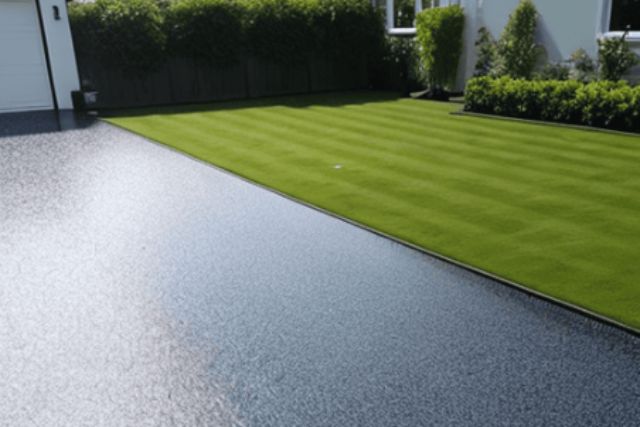Considering a resin driveway for your home but unsure of how to properly maintain it?
We explore the benefits of choosing a resin driveway, including durability, low maintenance, and aesthetic appeal.
Get practical tips on how to keep your resin driveway looking its best, from regular cleaning to repairing cracks and damage.
Discover the dos and don'ts of resin driveway maintenance and how to prevent common problems such as fading, oil stains, and weed growth.
Learn more about maintaining your resin driveway for years to come!

What Is A Resin Driveway?
A resin driveway is a surface made by mixing natural aggregate with clear resin to create a smooth, durable, and visually appealing driveway.
Resin bound driveways are a popular choice due to their seamless finish, which is not only aesthetically pleasing but also provides a non-porous surface that is resistant to weeds and puddles. The construction process involves mixing the chosen aggregate with the resin before trowelling it onto the prepared base. Once set, the result is a strong and durable surface that can withstand heavy foot traffic and vehicle use. Resin bound driveways require minimal maintenance, simply needing occasional cleaning to keep them looking fresh and neat.
Learn more: How To Lay A Resin Bonded Driveway
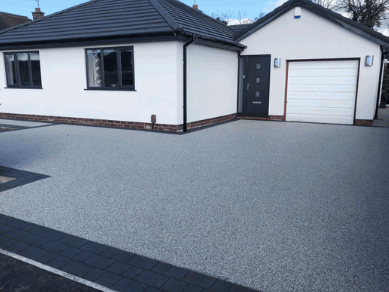
Why Choose A Resin Driveway?
Choosing a resin driveway offers numerous advantages, including easy care and maintenance, as well as resistance to unsightly tyre marks and stains.
Resin bound driveways are known for their exceptional durability, making them a long-lasting option for driveways that face regular vehicle traffic. The smooth and seamless finish of resin driveways not only enhances the overall visual appeal of the property but also provides a stylish and modern look that can complement various architectural styles.
Durability
The durability of a resin bound driveway is evident in its ability to withstand heavy vehicles, and harsh weather conditions like snow, and resist damage over time.
Resin driveways are designed to endure the weight of various vehicles, from compact cars to large trucks, without cracking or breaking under pressure. The unique composition of resin bound surfaces allows them to flex slightly, preventing structural damage from frequent car movements. These driveways are highly resistant to the extreme temperatures and moisture associated with snowy climates, ensuring they maintain their integrity even during harsh winter conditions.
Low Maintenance
One of the key benefits of a resin driveway is its low maintenance requirements, which can be easily managed through regular sweeping and occasional use of mild cleaning chemicals.
Regular sweeping of a resin driveway is crucial for preventing the build-up of debris and dirt, which can detract from its appearance and longevity. By simply using a broom or leaf blower on a regular basis, you can easily keep your driveway looking clean and well-maintained.
For stubborn stains or marks on the resin surface, the occasional use of cleaning chemicals can be beneficial. It's essential to choose mild cleaning agents specifically designed for resin surfaces to avoid any damage. These chemicals can help remove oil stains, tyre marks, or other blemishes effectively without harming the driveway.
Along with sweeping and cleaning, it's important to practice gentle care habits, such as avoiding sharp objects that could scratch the surface or heavy equipment that could dent the resin. By embracing these maintenance practices, you can ensure that your resin driveway remains in top condition for years to come.
Aesthetics
Resin driveways enhance the aesthetics of any property, providing a sleek and contemporary look that complements garden items and plant pots beautifully.
Smooth and elegant resin driveways not only elevate the overall visual appeal of a property but also create a harmonious blend with surrounding garden elements such as ornate fountain fixtures and colourful flower beds. The seamless finish of a resin driveway can act as a sophisticated backdrop for outdoor gatherings and evening soirees, enhancing the atmosphere with its modern charm. Whether it's a stylish bistro set or a collection of vintage plant pots, the clean lines and minimalistic design of resin driveways can effortlessly enhance the overall aesthetic of the outdoor space.
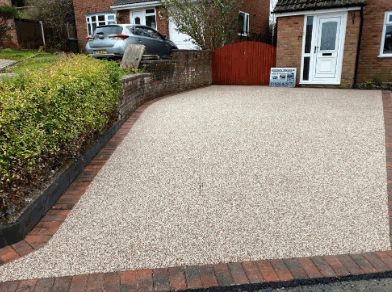
How To Maintain A Resin Driveway?
Maintaining a resin driveway involves regular cleaning using a jet wash or pressure washer to remove dirt, debris, and any stubborn stains that may accumulate over time.
It is essential to keep the surface clean not only for aesthetic reasons but also to prolong the lifespan of your resin bound driveway.
- Start by sweeping the driveway regularly to remove loose dirt and debris.
- To tackle tougher stains, use a jet wash with a gentle cleaning solution to avoid damaging the resin surface. Be cautious with the pressure setting on the washer to ensure it is suitable for resin driveways and won't cause any harm.
- Consider applying a protective sealant periodically to enhance the durability and appearance of your driveway.
Regular Cleaning
Regular cleaning of a resin driveway involves using a snow shovel in winter months to remove snow and ice, preventing build-up and potential damage.
Proper maintenance not only enhances the aesthetic appeal of the driveway but also ensures its longevity. Resin driveways are durable, but they require regular care to preserve their quality.
When snow and ice accumulate on the surface during winter, using a snow shovel is essential to prevent moisture seepage into the resin and potential cracking. By promptly clearing snow, homeowners can maintain the integrity of their driveway and avoid costly repairs. This simple task becomes crucial during the colder months to keep the driveway in optimal condition.
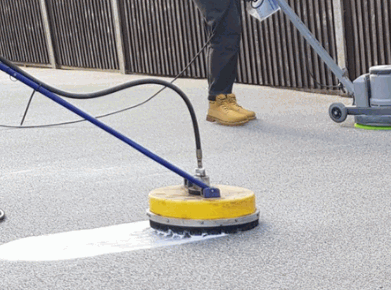
Removing Stains
Efficiently removing stains from a resin driveway involves targeted cleaning methods for specific issues like tyre marks, and using suitable cleaning agents to restore the surface to its pristine condition.
When dealing with stubborn tyre marks on a resin driveway, a mixture of bicarbonate of soda and water can work wonders. This simple yet effective solution helps to lift the marks without damaging the driveway surface.
For oil-based stains, applying a poultice made of powdered washing powder and water can help absorb the oil and lift the marks effectively. It is important to allow the cleaning agent to sit on the stain for a sufficient amount of time before gently scrubbing the area with a brush to ensure thorough removal.
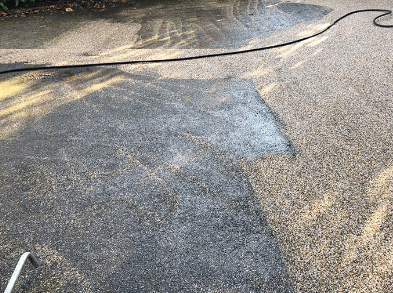
Repairing Cracks And Damage
Repairing cracks and damage on a resin driveway involves patch repairs using an aggregate blend and wooden planks as support to restore the structural integrity of the surface.
When addressing cracks in a resin driveway, the first step is to clean the damaged area thoroughly, ensuring no debris or loose material remains. Once clean, a patch repair material, often mixed with an aggregate blend for durability, is carefully applied. This blend not only fills the crack but also ensures a strong bond with the existing resin surface. For larger cracks or areas of damage, placing wooden planks vertically along the edges can provide crucial structural support during the repair process, preventing further deterioration and maintaining the driveway's longevity.
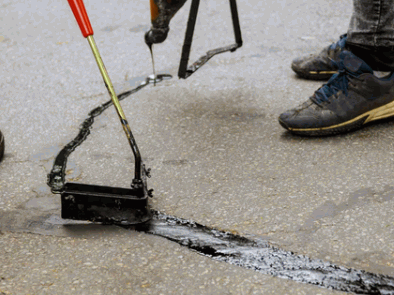
Resealing The Surface
Resealing the surface of a resin driveway is essential to protect it from water damage and maintain its lustre, requiring periodic reapplication of a suitable sealant.
When water seeps into small cracks and crevices in the resin bound driveway, it can gradually weaken the structure and lead to unsightly issues like discolouration and loosening. By consistently resealing the surface, you create a protective barrier that shields the driveway from moisture infiltration, ensuring its visual appeal and structural integrity.
Regular reapplication of a compatible sealant not only safeguards against water damage but also extends the lifespan of your resin driveway, reducing the need for costly repairs or premature replacements. This simple maintenance task goes a long way in preserving the beauty and functionality of your outdoor space.
What Are The Dos And Don'ts Of Resin Driveway Maintenance?
Understanding the dos and don'ts of resin driveway maintenance is crucial to ensure the longevity of the surface and prevent damage from vehicles or excessive use of pressure washers.
In terms of maintaining a resin bonded driveway, it is important to regularly sweep the surface to remove debris and dirt that can cause abrasions or scratches. Avoid using sharp tools or heavy machinery directly on the resin as they can lead to permanent damage. Be mindful of how vehicles are parked on the driveway; heavy vehicles should not be parked in the same spot for extended periods to prevent indentations. Using a gentle cleanser with a soft brush is recommended for cleaning while avoiding high-pressure washing that can loosen the aggregate and damage the surface.
Dos
- Dos for resin driveway maintenance includes using gentle cleaning chemicals, promptly removing weeds, and addressing any surface issues to preserve the driveway's integrity.
In terms of choosing cleaning chemicals for resin driveways, opt for products specifically designed for such surfaces to avoid damaging the resin.
Proactive weed removal is vital to prevent weeds from taking root and causing structural damage to the driveway over time.
Regularly inspecting the surface for any cracks, chips, or discoloration and taking prompt action to remedy these issues can help extend the lifespan of the driveway.
Don'ts
Avoiding certain practices is essential for resin driveway maintenance, such as using excessive force with ice removal or allowing grit to accumulate, which can lead to surface damage.
In terms of maintaining resin driveways, it's crucial to handle ice removal with care. Instead of forcefully chipping away at the ice, opt for gentler methods like using a plastic shovel or ice melt that is safe for the surface. It's also important to regularly sweep away any accumulated grit or debris, as these can scratch and wear down the resin over time.
What Are The Common Problems With Resin Driveways?
Resin driveways may encounter common issues such as fading and discolouration, oil stains, and weed growth, which can detract from their visual appeal and structural integrity.
While fading and discolouration can result from prolonged exposure to UV rays and harsh weather conditions, oil stains are usually caused by vehicle leaks or spills, leading to unsightly marks on the surface.
Weed growth can be a persistent problem, as vegetation can find its way through cracks and crevices in the resin bound driveway, compromising its smooth appearance.
These issues not only affect the overall aesthetics of the driveway but also pose a threat to its longevity and durability.
Fading And Discoloration
Fading and discolouration in resin driveways can be exacerbated by exposure to salt, grit, and harsh conditions during the Winter months, requiring proactive care to maintain the surface's appearance.
The impact of salt exposure on resin driveways is significant, as salt can penetrate the surface and lead to structural damage over time. Winter conditions, with freezing and thawing cycles, can cause expansion and contraction that further weaken the resin bound driveway, hastening deterioration.
It is crucial to regularly clean and seal the driveway to protect it from these elements. Applying a high-quality sealant can create a barrier against salt intrusion and weathering, helping to preserve the attractive finish of the surface.
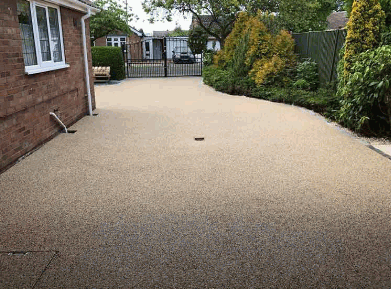
Oil Stains
Oil stains from vehicle tyre treads can spoil the appearance of a resin driveway, requiring swift cleaning with suitable products to prevent lasting marks and uphold the surface's cleanliness.
These unsightly marks often arise due to the nature of oil residue that seeps into the resin, forming stubborn stains. If not dealt with promptly, these stains can embed themselves, making it difficult to restore the driveway's original aesthetics.
Using specific cleaning products formulated for oil stains can effectively break down the residue and remove it from the surface without causing harm. This not only aids in eliminating the marks but also safeguards the integrity of the resin driveway for an extended period.
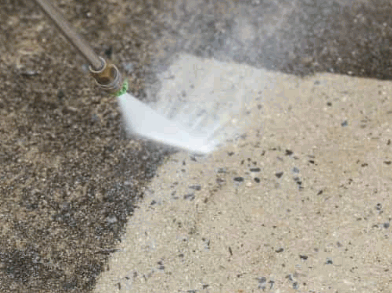
Weed Growth
Weed growth on resin driveways can be controlled through the use of suitable chemicals or manual removal methods, preventing unsightly vegetation from detracting from the driveway's appearance.
Resin-bound driveways are not only stylish and durable but also require proper maintenance to ensure their longevity and aesthetic appeal. The challenge of weed growth on these surfaces arises due to the porous nature of resin, providing an ideal environment for unwanted plants to take root.
Using the right chemicals, such as selective herbicides, can effectively target and eliminate weeds without harming the driveway surface. Manual removal techniques, like hand weeding or brushing, offer a more environmentally friendly approach to keeping weeds at bay.
Regular maintenance and weed control efforts are crucial to preserving the smooth and clean look of a resin-bound driveway, enhancing the overall curb appeal of the property.
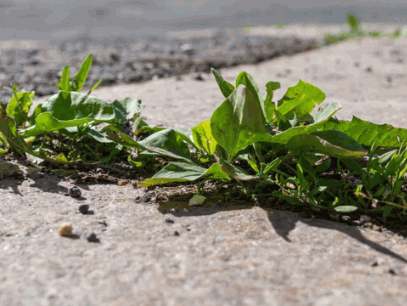
How To Prevent These Problems?
Preventing common issues with resin driveways involves selecting high-quality resin, ensuring proper installation to minimise cracks, and committing to regular maintenance practices.
In terms of selecting the right resin for your resin bound driveway, it is essential to prioritize quality over cost. Opting for high-quality resin not only enhances the durability and longevity of your driveway but also reduces the likelihood of cracks developing over time.
Correct installation procedures play a crucial role in preventing issues with resin driveways. Ensuring that the base is properly prepared, the resin is mixed correctly, and the surface is laid evenly can significantly minimise the risk of cracks forming.
Consistent maintenance routines are equally important in preserving the integrity of your resin driveway. Regular cleaning, resealing when necessary, and addressing any minor damages promptly can help prevent larger issues from arising in the future.
Choosing High-Quality Resin
The choice of high-quality resin for a driveway is crucial to ensure water resistance, durability, and long-term performance without succumbing to common issues like cracking or discoloration.
High-quality resin acts as a protective shield for your driveway, offering a resilient barrier against water infiltration, which is essential for preventing damage caused by moisture. This durable material not only enhances the strength of the gravel driveway surface but also increases its resistance to wear and tear over time. By opting for top-notch resin, you are investing in the long-lasting integrity of your driveway, reducing the need for frequent repairs and maintenance.
Proper Installation
Proper installation of a resin driveway involves considerations for snow and ice management, ensuring a stable foundation and adequate drainage to prevent damage and maintain surface integrity.
In terms of managing snow and ice on a resin driveway, proper installation techniques are crucial. A well-installed driveway will have a level surface with sufficient drainage slopes, reducing the risk of water accumulation that can lead to freezing and cracking during colder months. A strong foundation is essential to withstand the weight of ice and snow, preventing any structural damage. By addressing these factors during the installation process, homeowners can enjoy a durable and long-lasting resin driveway that remains both functional and visually appealing.
Regular Maintenance
Regular maintenance of a resin bound drive is essential to address issues like ice build-up, and surface cracks, and preventatively reduce the risk of common problems that can compromise its longevity.
Ice build-up on a resin bound drive can lead to slippery surfaces, posing potential safety hazards, especially during colder months. By regularly maintaining the drive, you can ensure proper drainage, improving its resistance to ice formation. Addressing surface cracks promptly through maintenance helps prevent further deterioration and water penetration, which can weaken the drive over time. Proactively managing these issues not only sustains the drive's structural integrity but also preserves its aesthetic appeal, enhancing the overall look of the property.

